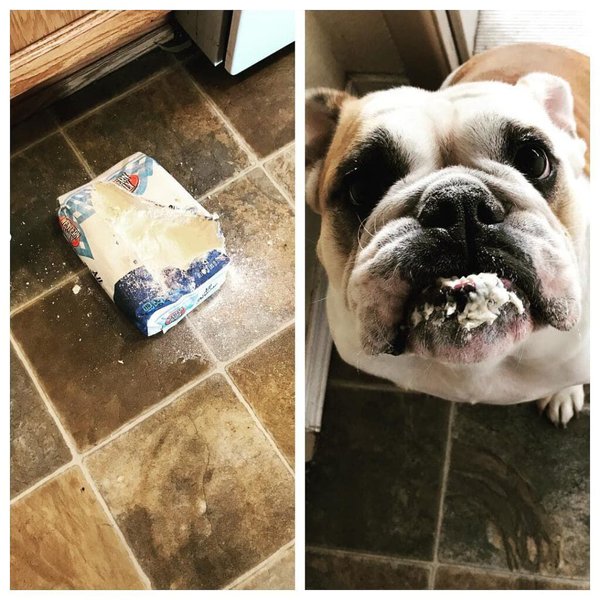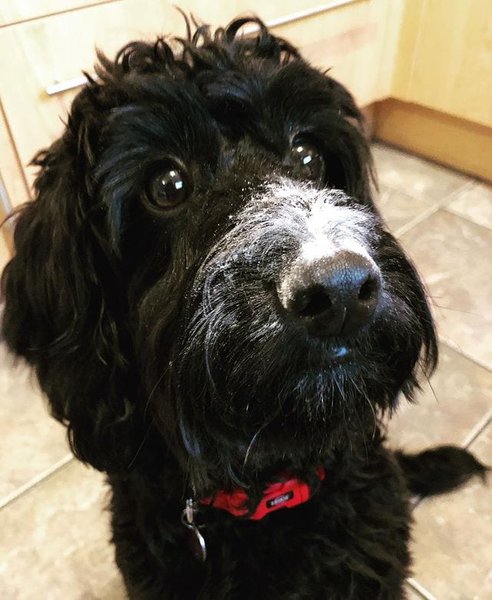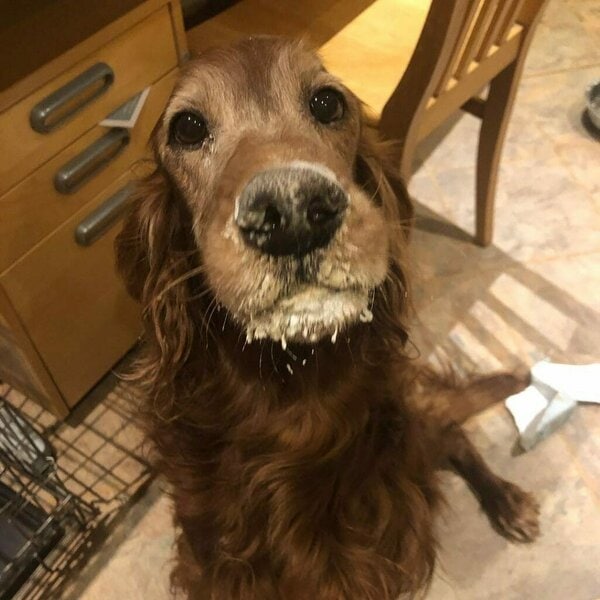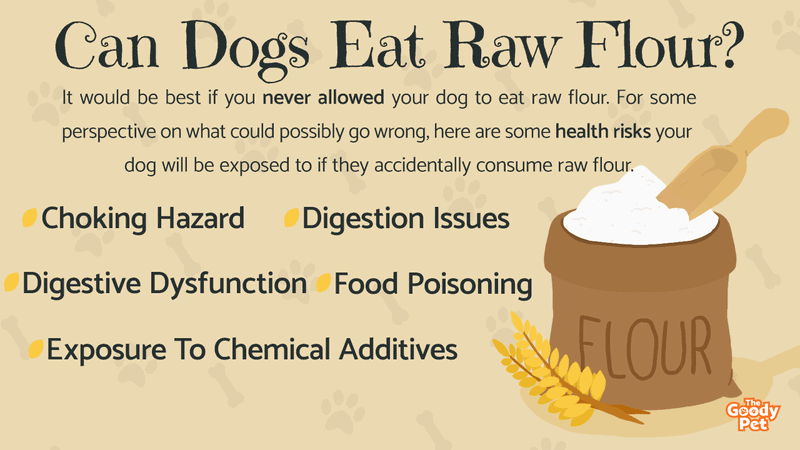Flour has pretty much become ubiquitous in our diets in this day and age of heavy food processing. You will find flour as an ingredient everywhere, from candy bars to soft drinks and even condiments.
The same is the case with most processed dog foods, which typically feature flour from wheat and other grains as the main carbohydrate source. But is it actually a good idea to let your dog eat flour?
Yes, dogs can eat flour and all-purpose flour. However, it is not a good idea for dogs to eat them. In addition to the fact that flour has very little, if any, nutritional benefit to your dog, there is the fact that overconsumption could result in consequences like obesity.
Let’s take a closer look at all you need to know about letting your dog consume food and treats made using flour as a key ingredient. But first, let’s answer the question of whether or not dogs can eat flour. Quick hint; the answer is both yes and no.
Can Dogs Eat Flour?

Dogs can eat flour, but they really do not need to.
This is because most of the commonly available flour options are heavily processed and devoid of all the important nutrients that your doggy needs to thrive.
The only benefit your pooch has to look forward to is access to the energy-giving carbohydrates. However, these are easily found from other healthier sources, including whole grains and high-fiber starchy foods like sweet potatoes.
Another alternative source of carbohydrates to flour in your dog’s diet is fruits which also offer access to other crucial nutrients, including vitamins.
However, it is important to note that not all flour is completely useless to your dog’s diet. Whole-grain wheat flour is a great ingredient to have in your dog’s food and treats. It comes with numerous health benefits, including improved digestion, given that it is rich in fiber.
Can Dogs Eat All-Purpose Flour?
All-purpose flour is typically non-toxic to dogs. Technically speaking, this means that your dog can safely consume dog food and treats that include all-purpose flour.
However, as with most other processed types of flour, all-purpose flour offers little to no nutritional value to your dog. It is thus better avoided in the dog’s diet and instead replaced with healthier and more nutritionally-dense carbohydrate sources.
Can Dogs Eat Raw Flour?

It would be best if you never allowed your dog to eat raw flour. For some perspective on what could possibly go wrong, here are three health risks your dog will be exposed to if they accidentally consume raw flour.
Choking Hazard
Most flour today is so intensely processed that the final product is a very fine powder that can very easily be inhaled and aspirated on by the dog.
It will take a good about of flour to cause serious damage or even death to the dog. However, even a small mouthful that goes down the wrong hole is enough to cause issues like pneumonia or throat injuries for the dog.
Food Poisoning
Raw flour is typically contaminated with dust, pests’ droppings, and bacteria collected through the harvesting and processing stages. If your dog eats raw flour, it will be exposing itself to all these contaminants.
The result may be serious food poisoning, with bacteria like Escherichia coli being the most common culprit.
Digestion Issues
Another concern that arises from dogs eating raw flour is the risk of intestinal obstruction. This is very likely to happen if your dog consumes a large amount of dry, raw flour.
The flour absorbs moisture in the dog’s gut and forms a thick sludge that could predispose your dog to intestinal obstruction and constipation.
If you notice your dog ate some raw flour when they were left unsupervised, the best thing to do to avoid digestion issues is to give them plenty of water. There is no guarantee that it will prevent constipation, but it is definitely effective enough to make it worth trying.
It would be best if you never allowed your dog to eat raw flour. For some perspective on what could possibly go wrong, here are three health risks your dog will be exposed to if they accidentally consume raw flour.
Choking Hazard
Most flour today is so intensely processed that the final product is a very fine powder that can very easily be inhaled and aspirated on by the dog.
It will take a good about of flour to cause serious damage or even death to the dog. However, even a small mouthful that goes down the wrong hole is enough to cause issues like pneumonia or throat injuries for the dog.
Food Poisoning
Raw flour is typically contaminated with dust, pests’ droppings, and bacteria collected through the harvesting and processing stages. If your dog eats raw flour, it will be exposing itself to all these contaminants.
The result may be serious food poisoning, with bacteria like Escherichia coli being the most common culprit.
Digestion Issues
Another concern that arises from dogs eating raw flour is the risk of intestinal obstruction. This is very likely to happen if your dog consumes a large amount of dry, raw flour.
The flour absorbs moisture in the dog’s gut and forms a thick sludge that could predispose your dog to intestinal obstruction and constipation.
If you notice your dog ate some raw flour when they were left unsupervised, the best thing to do to avoid digestion issues is to give them plenty of water. There is no guarantee that it will prevent constipation, but it is definitely effective enough to make it worth trying.

Exposure To Chemical Additives
Most flour brands include a lot of chemical additives to enhance the flavor, color, and shelf life. All these contaminate your dog’s system and compromise its cellular integrity. By extension, this could put them at a high risk of getting health issues like cancer later on in life.
Digestive Dysfunction
Consuming too many flour-based products, in the long run, will do your dog’s digestive system a lot of damage.
From indigestion to toxic chemical additive exposure, you may find your dog having long-standing digestive issues like bloating and constipation or diarrhea.
All these could easily be traced back to the high quantities of flour in low-quality dog foods and treats where the flour is used as a filler ingredient.
These digestive issues are also likely to happen as a result of undetected gluten or grain allergies.





